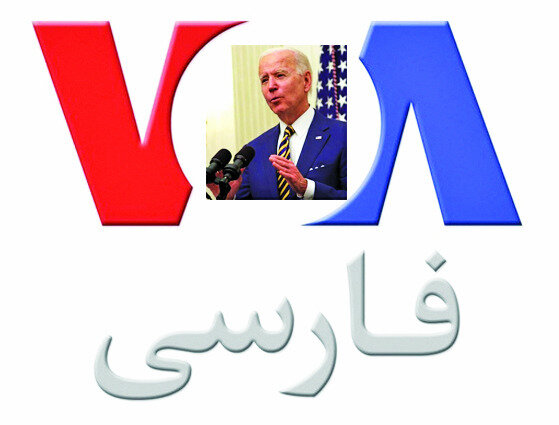VOA Persian: Biden’s secret weapon in Iran nuclear talks

TEHRAN- The internet revolution has affected all aspects of life, including politics, international relations and diplomacy as a tool of foreign policy.
In fact, media can function as a powerful instrument for advancing foreign policy and international negotiations. In other words, officials use “media diplomacy” to communicate with international actors. Actually, journalists can temporarily play the role of diplomats and serve as non-state brokers in international negotiations mostly focused on conflict resolution.
In parrel, influencing public opinion at home as well as overseas is quite crucial and if state officials ignore public diplomacy, they may make a critical mistake.
Given the Joe Biden administration’s stated policy to revive the 2015 Iran nuclear deal, some think tanks have emphasized that the Oval Office should use its media policy effectively and proportionately in resetting Iran policy.
Against the backdrop, on February 17 Ilan Berman, senior vice president of the American Foreign Policy Council (AFPC), writes that if the U.S. really wants to conclude a meaningful deal with Iran and reset its Iran policy, it should focus on its foreign media outlets as “secret weapons”.
Berman has consulted for the U.S. Central Intelligence Agency (CIA) as well as the U.S. Departments of State and Defense. He regularly proposes several testimonies before the U.S. Congress to draw roadmaps to deter Iran. This fellow has been called one of America's "leading experts on the Middle East (West Asia) and Iran" by CNN.
In the article posted on the AFPC website, Berman, a pro-Israel analyst, harshly blames Michael Pack, the CEO of the U.S. Agency for Global Media (USAGM), describing him as “the very first personnel casualty of the Joe Biden administration.” AFPC also believes that Pack-appointed leaders at Voice of America (VOA), Radio Free Europe, and Radio Free Asia have been quite incompetent, too.
It is worth mentioning that raising overt heavy criticism against this congressionally funded broadcaster is not something new. Brian Hook, the former U.S. special representative for Iran, on 28 May 2020 harshly criticized Voice of America Persian News Network (VOA-PNN). He emphasized that VOA Persian which received more than $17 million in 2019, has failed to fulfill its mission in “countering Iranian disinformation and propaganda.”
In addition, in 2017 and 2019, AFPC conducted assessments of VOA’s Persian programming which confirms the results are quite in accordance with Berman’s analysis.
In Berman’s words, VOA is “one of the most out-of-date, inefficient and scandal-ridden broadcast services administered by USAGM, plagued by everything from poor management to lackluster content.”
Mentioning "maximum pressure campaign" of the Trump era against Iran, Berman believes that although the Biden administration has not clarified several aspects of its foreign policy, its approach toward Iran so for shows a major departure from that of the Trump administration.
Therefore, as the Biden administration attempts to reshape U.S. foreign policy towards Iran, fixing such deep-rooted deficiencies is more crucial than ever.
In this context, Berman argues that USAGM and its Persian services are one of the fundamental pillars of the U.S. foreign policy to conduct public diplomacy to confront Iran.
AFPC acknowledges that American officials’ claims that VOA is significantly influential among Iranian people, there exists little empirical data to support this. Berman says that many interviews with longtime observers of Persian-language broadcaster carried out in recent months, implying that “the U.S. outreach is increasingly marginal and irrelevant to most Iranians.”
Berman emphasizes that VOA Persian suffers from several fundamental flaws and “the service needs to be fixed, top to bottom”. In this regard, he provides details of the root causes of its dysfunction and proposes a number of recommendations to reinforce “the service's inherent credibility as the authoritative ‘voice’ of the United States.”
The expert stresses that Biden should use VOA Persian wisely in his administration's mission of re-engaging Iran and notes that whether or not Biden makes it, the goal “will be a key test of how serious he is about restarting a real dialogue not just with the Iranian regime, but with the Iranian people as well.”
Undoubtedly, American media serve as an effective tool in their asymmetric warfare against Iran. And at the time being, dealing with Washington is placed at the top of Iran’s foreign policy agenda. Given the multilateral U.S.-led Western “smart war” against the Islamic Republic, it is vital for Tehran to set a detailed, proportionate, and effective roadmap in terms of media operation to preserve and promote its national interests in future talks with the United States. In fact, the Oval Office is already pretty ready to use its soft power to influence the global public opinion to equip American negotiators with ideational weapons to win the diplomatic race at the table.
Actually, in the current complicated diplomatic battlefield which the Islamic Republic is involved, using media smartly via various platforms, provides Tehran with cultural warriors to back the Iranian diplomats at the negation table. As the Leader of the Islamic Revolution Ayatollah Ali Khamenei has clarified, “what is going on is a war of wills”, therefore enjoying triumph in foreign policy is plausible provided that Iran acts wisely in the game of media policy.
Leave a Comment